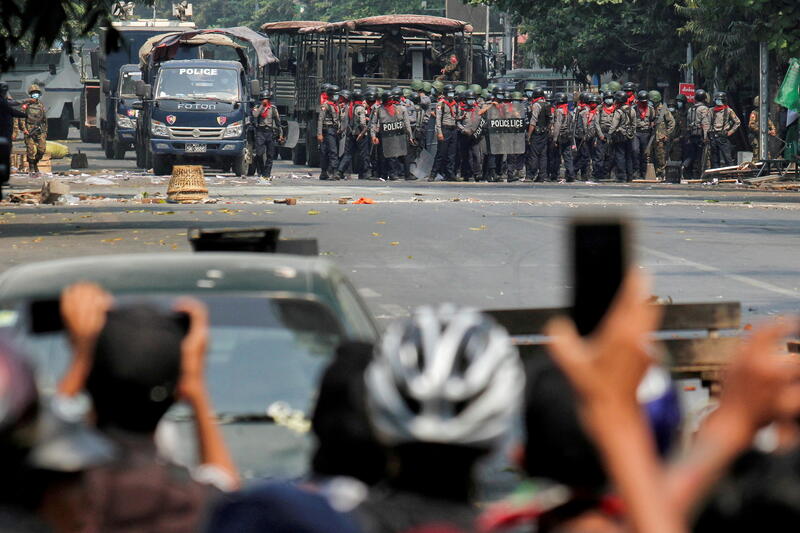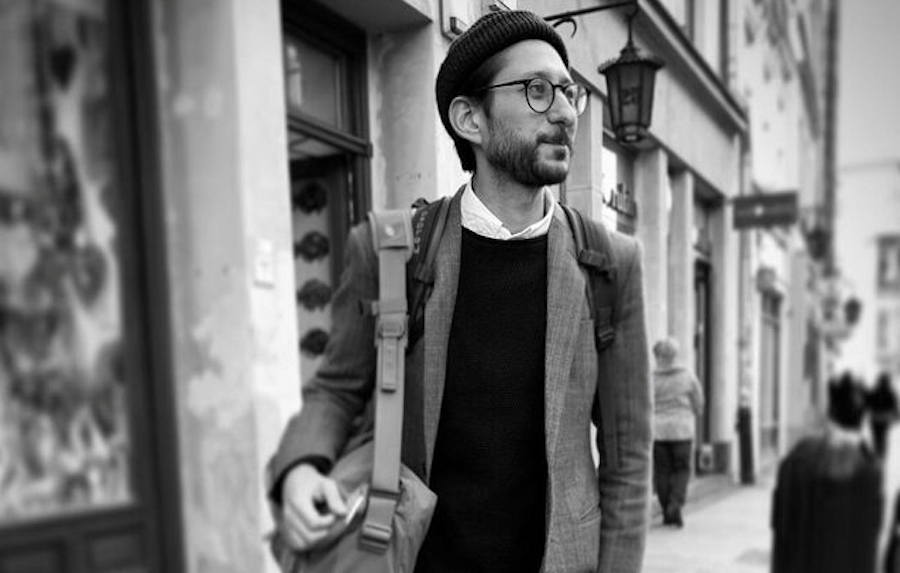As press freedom in Myanmar shrinks even further, an independent digital magazine embraces reader revenue to stay afloat

Police stand on a road during an anti-coup protest in Mandalay, Myanmar in March 2021. REUTERS
On 12 November American journalist Danny Fenster, managing editor of digital magazine Frontier Myanmar, was found guilty of three charges. He was given the toughest possible sentence, an 11-year jail term with hard labour.
Fenster had been arrested in May at Yangon International Airport for allegedly working for Myanmar Now, another independent news site banned by the military. According to Frontier Myanmar, Fenster, who got COVID-19 in jail, had quit Myanmar Now in July 2020. Three days after the sentence, Fenster was freed and flown to the United States.
Not many journalists in the country are as lucky as Fenster. Many have fled Myanmar, others have quit journalism altogether and the few who are in the country have to work in hiding, said Philip Thornton, a journalist and South East Asia advisor at the International Federation of Journalists.

In June Michelle Bachelet, United Nations High Commissioner for Human Rights, released a statement saying more than one hundred journalists, publishers or media officials had been arrested by the military. By July, 43 journalists were held according to Reporters Sans Frontiers. “The immense majority are being prosecuted under 505(a) of the criminal code, under which spreading “fake news” is punishable by three years in prison”, the organisation said. Fenster was charged under the same law.
Two weeks after taking power on 1 February 2021, the military junta amended Section 505(a) of the Code of Criminal Procedure to make offences non-bailable and subject to arrest without a warrant, according to Human Rights Watch.
In June Aung Kyaw, a reporter from the Democratic Voice of Burma, and Ko Zaw Zaw, a freelance reporter with Mizzima News, were sentenced to two years of jail under Section 505(a) of the Penal Code of Myanmar. Two months before, Japanese journalist Yuki Kitazumi had become the first foreigner to be charged under the law. Myanmar authorities released him at the request of his country’s government, according to the BBC.
“The level of self-censorship is very high, especially on three subjects: the Rohingya minority (the term is even banned), the Buddhist religion (Myanmar’s social glue) and [political leader] Aung San Suu Kyi,” according to Reporters Without Borders, which ranked Myanmar 140 out of 180 nations on the press freedom index.
Two independent news sites
Myanmar Now is a news website established by the Thomson Reuters Foundation in the lead-up to the 2015 general election in which Aung San Suu Kyi’s National League for Democracy won a decisive victory. The site is led by investigative journalist Swe Win, who served a seven-year jail term as a student leader for being involved in the country's democracy movement.
Since the military coup, the team at Myanmar Now has reported relentlessly despite arrests and repeated physical threats. On 8 March, the military raided its office before announcing a ban on five media outlets, including Myanmar Now. Myanmar Now's newsroom is now in hiding. Swe Win manages a 40-member editorial team from exile.
Frontier Myanmar is a fortnightly magazine publishing long-form, investigative journalism from all parts of the country. “We read it to get context to the daily breaking news stories,” a law student at the University of Yangon told me earlier this year. She prefers to remain nameless now, as she is afraid of the action the military might take against those who speak to foreign news outlets.
The magazine was founded by Sonny Swe in July 2015. This was a good time to do investigative journalism in the country. Three years before, the government had abolished the country's infamous censorship regime and Nobel laureate Aung San Suu Kyi had been elected a Member of Parliament for the first time.
Swe was not a new-comer. In 2000 he had founded The Myanmar Times, the first private English-language newspaper in the country. He was jailed for his work at the paper between 2004 and 2013.
February 2021 was going to be a moment of truth for Frontier Myanmar, according to Ben Dunant, who worked for the publication until May this year. In January 2020 the magazine had started a membership programme, the only one in the country. 421 members had signed up for 12 months and 147 print subscribers were grandfathered into the new plan.
In February 2021 the team was eagerly waiting to see how many would renew their membership for a second year. Then the coup happened and reader revenue went up. “Frontier’s membership expanded substantially after the coup, likely due to readers’ desire to support independent journalism in its wake”, said Dunant.
Frontier Myanmar had launched its membership programme a few weeks before the pandemic shrunk its ad revenue unrecognisably. The magazine built this digital community one member at a time through extensive questionnaires, focus groups, and rigorous reader feedback. “The focus groups challenged several of Frontier Myanmar’s assumptions about what types of member-only products would resonate, and gave them confidence that their message would resonate,” wrote Ariel Zirulnick, from the Membership Puzzle Project.
The magazine reported extensively about child trafficking and the Rohingya community. In January 2021, a few weeks before the coup, they ran a cover story analysing National League for Democracy’s electoral victory in November 2020. The Aung San Suu Kyi-founded NLD, which was in power before the coup, does not have a stellar record of media freedoms by Frontier Myanmar’s own telling.
Even after the coup, Frontier Myanmar has continued reporting on similar socio-economic issues. Publishing deeply reported pieces has made them popular among their readers. However, the entire website is now behind a paywall and available only to paying members. The price of an annual membership starts at USD 80 (approx 143 Burmese Kyat). These rates are quite high for an average news consumer within a country where roughly 37% of the people live below the poverty line.
Frontier Myanmar stopped publishing its printed edition after the coup, said Dunant, who is now a freelance journalist in the UK.
The fight for press freedom
In August 2017, Myanmar security forces began "clearance operations" against the Rohingya minority in the northern Rakhine state. Various international human rights groups reported widespread indiscriminate attacks on the Rohingya Muslim population and denounced them as "ethnic cleansing" and “genocide."
Greater restrictions were placed on the media and Myanmar fell to 139 out of the 180 countries on the global press freedom index.
One of the biggest blows to press freedom has been the seven-year prison sentence that Reuters journalists Wa Lone and Kyaw Soe Oo received in September 2018 for trying to investigate a massacre of Rohingya civilians. They were finally pardoned and freed after more than 500 days in prison and a major international campaign for their release, but their conviction on the basis of fabricated evidence and bogus criminal proceedings still stands. Their fate served as a warning to all journalists, who may think twice before attempting investigative reporting that could upset either the government or the armed forces.
The environment for media freedoms has only worsened since then. “The establishment tries to control the media by using traditional tools such as restrictive laws or forcing journalists into finding,” said Gayathry Venkiteswaran, Assistant Professor at University of Nottingham Malaysia Campus, co-editor of the 2019 book Myanmar Media in Transition: Legacies, Challenges, and Change. “But society has changed a lot. One, because of the democratic experiment the country underwent in the past five years. Two, because of technological and digital disruptions.” Although the military establishment can cut off the internet or slow it down considerably, she said, they cannot stop community-based organising and information sharing.
And yet for most citizens of the country, the situation is still rather dire.
Activist and organiser Me Me Khant says that it’s out of the authoritarian playbook to shut down media freedoms and the internet to keep the population in darkness and spread their own lies.
“Journalists like Danny Fenster are at the frontline of truth, reporting the junta’s cruelty to the world. So they view journalists as a threat to their power. They scare them,” she said. “This should be a wake-up call to governments around the world. The Myanmar military needs to be taken accountable for their human rights violations. The junta is getting emboldened each day by the laughable incapacity of the international response.”
Raksha Kumar is a freelance journalist, with a specific focus on human rights. Since 2011, she has reported from 12 countries across the world for outlets such as 'The New York Times', BBC, the 'Guardian', 'TIME', 'South China Morning Post' and 'The Hindu'. Samples of her work can be found here.







